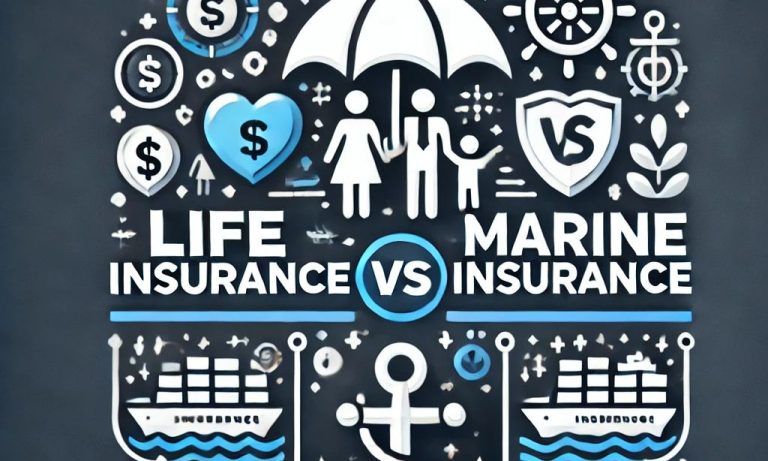Life insurance and marine insurance are two types of insurance that serve different purposes. Life insurance offers protection for the life of the individual if he or she dies or is severely ill, while marine insurance protects assets related to maritime activities, including ships and cargo. Both kinds of insurance are essential for risk minimization and financial security. This article will explore definitions, benefits, differences, and coverages of life insurance and marine insurance in order to better understand how they serve different purposes.
What is Life Insurance?
Life insurance is a financial product that offers a payout to beneficiaries in the event of the policyholder’s death or serious illness. The primary purpose of life insurance is to provide financial protection to loved ones, covering living expenses, debts, and other financial obligations after the policyholder’s passing. Depending on the type of policy, life insurance may also offer a savings component or investment benefits, providing the policyholder with both life coverage and an opportunity for growth in their funds.
There are different types of life insurance, each serving distinct needs:
- Term Life Insurance: This policy provides coverage for a specified period, and the payout is made only if the policyholder dies within that term.
- Whole Life Insurance: A permanent policy that covers the policyholder for life and builds cash value over time.
- Universal Life Insurance: Similar to whole life insurance but with flexible premiums and coverage amounts.
- Endowment Policies: These policies combine life coverage with a savings plan, where the policyholder receives a lump sum after a specific term or in case of death.
Benefits of Life Insurance
- Financial Security: Provides financial support to your family in case of your death.
- Debt Repayment: Helps cover outstanding debts, such as mortgages or loans, preventing your family from bearing the burden.
- Wealth Building: Some life insurance policies help build cash value or savings over time.
- Tax Benefits: Life insurance policies often come with tax advantages, including tax-free death benefits.
What is Marine Insurance?
Marine insurance is a type of insurance that covers vessels, cargo, and freight while in transit on the seas. It is designed to protect assets involved in shipping from various risks, including accidents, piracy, and natural disasters. Marine insurance ensures that the financial losses caused by damages to ships or goods during transit are minimized. This form of insurance is essential for businesses involved in international trade, shipping, and logistics.
Marine insurance typically includes coverage for:
- Hull Insurance: Protects the ship itself from damage.
- Cargo Insurance: Covers the goods being transported.
- Freight Insurance: Provides coverage against loss of freight income.
- Liability Insurance: Covers legal liabilities for accidents or damages caused by the vessel.
Benefits of Marine Insurance
- Financial Protection: Safeguards your investments in ships and cargo.
- Risk Mitigation: Helps reduce the financial impact of unpredictable events like accidents, theft, or natural disasters.
- Global Coverage: Marine insurance is often valid worldwide, making it ideal for businesses involved in international shipping.
- Customizable Policies: Policies can be tailored to suit specific needs, such as the type of cargo or the shipping routes.
Difference Between Life Insurance & Marine Insurance
Although both life insurance and marine insurance offer protection, they serve vastly different purposes and cover different types of risks. Below are five key differences between life insurance and marine insurance:
Purpose of Coverage
- Life Insurance: Life insurance protects individuals and their families in case of death, illness, or disability. It ensures that loved ones are financially supported during tough times.
- Marine Insurance: Marine insurance protects ships, cargo, and freight involved in shipping. It helps businesses avoid financial losses caused by risks like accidents, theft, and natural disasters during transit.
Type of Risk Covered
- Life Insurance: Life insurance covers risks such as death, illness, and disability. It ensures that the policyholder’s family has financial support if something happens to the policyholder.
- Marine Insurance: Marine insurance covers risks like ship damage, cargo theft, piracy, and natural disasters. It helps protect maritime assets during transportation over water.
Beneficiaries
- Life Insurance: The beneficiaries are usually family members or loved ones who receive the payout in case of the policyholder’s death or illness.
- Marine Insurance: The beneficiaries are typically business owners, shipping companies, or traders who have a financial interest in the insured ship or cargo.
Duration of Coverage
- Life Insurance: Life insurance can be temporary (for a set number of years) or permanent (for the policyholder’s entire life).
- Marine Insurance: Marine insurance is specific to a voyage or transport period. It only covers the asset while it is in transit.
Premium Structure
- Life Insurance: Premiums depend on age, health, and lifestyle. Younger, healthier individuals usually pay lower premiums.
- Marine Insurance: Premiums depend on the value of the cargo, the type of vessel, and the risks involved in the shipping route.
| Aspect | Life Insurance | Marine Insurance |
| Purpose | Protects individual life and health | Protects ships, cargo, and freight |
| Risk Coverage | Death, illness, disability | Ship accidents, theft, piracy, natural disasters |
| Beneficiaries | Family or loved ones | Business owners, shipping companies |
| Duration of Coverage | Term-based or permanent | Voyage or period-specific |
| Premium Calculation | Based on health, age, lifestyle | Based on value, cargo, shipping risk |
Conclusion
In conclusion, life insurance and marine insurance serve two distinct yet crucial functions in providing financial protection. Life insurance focuses on ensuring the well-being of individuals and their families by offering coverage in the event of death, illness, or disability. On the other hand, marine insurance offers protection for assets involved in maritime activities, covering risks such as ship accidents, cargo damage, and piracy. Both types of insurance are essential for managing risks and ensuring financial security in their respective fields.
Life Insurance vs Marine Insurance FAQs
What is the difference between life insurance and marine insurance?
Life insurance protects individuals against death or illness, while marine insurance protects ships, cargo, and freight from maritime risks like accidents and piracy.
What is an example of life insurance?
An example of life insurance is when an individual buys a term life policy to provide a lump sum to their family in case of their death.
What does marine insurance cover?
Marine insurance covers risks like ship damage, cargo theft, piracy, natural disasters, and liability for accidents involving vessels.
Is life insurance and marine insurance the same?
No, life insurance covers individuals’ health and life, whereas marine insurance covers maritime assets such as ships and cargo.
How do premiums for life insurance and marine insurance differ?
Life insurance premiums are based on the policyholder’s age, health, and lifestyle. While marine insurance premiums depend on the value of the cargo, the vessel, and the shipping risks involved.


